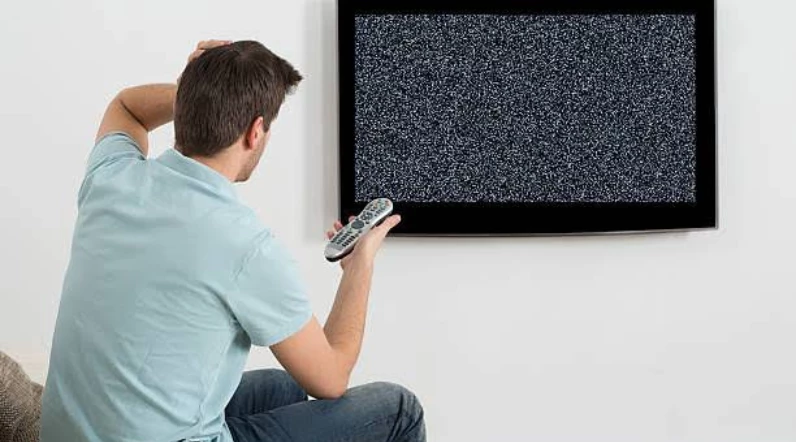Two years ago, I wrote numerous articles offering solutions to problems with various TV brands like Samsung, LG, and Hisense.
This time, I want to talk about something else – the things you might be doing without realizing it, which could be shortening the life of your TV.
It’s essential to safeguard your TV from avoidable damage, and knowing about these everyday habits could go a long way in extending the life of your television.
Let’s dive in…
1) Keeping it on All the Time
This is a common scenario in many households, but it’s a big mistake that leads to increased energy consumption, higher electricity bills, and potential damage to the TV itself.
Although most LED, LCD, OLED, and plasma-screen TVs can operate continuously for a long time, doing so will shorten the life of your TV.
Every television has a predefined life cycle that is measured in hours used.
Once you reach this point, your TV’s components will begin to work at half-life, which means your picture won’t be as bright as expected.
2) Not Cleaning It Regularly
Typically, cleaning a TV screen takes only a few minutes, but many folks neglect it.
James says,
“I neglected to clean my TV screen for a long time, and it caused some permanent damage. There were some discolored spots on the screen that ruined my overall viewing experience. Sh**t.”
If you don’t clean your TV regularly, dust, grime, and dirt can build up on the screen, and the picture quality will gradually degrade.
You may start to notice a decrease in clarity, color accuracy, and brightness.
Furthermore, a buildup of dust on the TV’s vents can cause overheating, leading to TV malfunction and even becoming a fire hazard.
Never use harsh chemicals or abrasive materials to clean the screen, as they can damage the protective coating on the TV screen.
3) Not Updating the Firmware
Firmware is similar to your brain in the sense that it acts as the “operating system” for a device, much like the brain acts as the “operating system” for the human body.
Like the brain, firmware is responsible for managing and coordinating the hardware components of a device to ensure that it functions properly.
But my point is, sometimes the firmware gets corrupted or infected by malware which affects the TV’s overall functionality.
If you don’t update the TV’s firmware when available, you are digging yourself into a hole.
Your TV might start acting funny, crashing all the time, or even getting attacked by malicious software. So update the TV whenever available!
However, I’m damn sure you know how to do that.
If you are unsure how to update your TV’s firmware, consult your TV’s user manual for assistance.
4) Keeping It in a Bad Environment
Poor environmental conditions are another significant factor that hugely easily impedes the lifespan and performance of aTV.
Whether it’s extreme temperatures, humidity, dust, or other factors, these heavily affect the TV’s internal components and display screen.
Keep the TV in a dry, dust-free environment that is at a comfortable temperature.
If possible, use a dehumidifier to reduce the humidity levels in the room.
Also, ensure that you installed the TV away from direct sunlight. Because the UV rays from the sun can cause permanent damage to the TV screen.
5) Skipping the calibration process
I don’t know whether you know about this process or not.
Calibration process is meant to help you optimize the picture settings for the best quality, which includes adjusting the color, contrast, brightness, and other settings.
Skipping the calibration process could result in a picture that is too dark, too bright, or has inaccurate colors.
According to Cinetuneav.com, the calibration process can boost the lifespan of a TV by:
- Maximizing the TV’s system performance.
- Experiencing programs and movies as they were intended.
- Extending components of life.
However, If you decide to skip the calibration process on your TV, the picture quality and settings may not be as accurate as they could be and you may not be able to access certain features on the TV, like HDR or motion smoothing.
F.A.Q.s
Q: Can leaving my TV on all the time affect its lifespan?
Yes, keeping your TV on for extended periods can shorten its lifespan.
Like any electronic device, TVs have components that wear out over time, and continuous usage can accelerate this process.
It is recommended to turn off your TV when not in use to extend its lifespan.
Q: Can watching TV at high brightness settings damage the screen over time?
Yes, watching TV at high brightness levels can contribute to screen burn-in or image retention issues, especially with OLED and plasma displays.
Lowering the brightness and using screensavers during idle times can help prevent long-term damage.
While high brightness settings can lead to screen burn-in on certain display technologies, most modern TVs have advanced image retention prevention mechanisms.
However, I suggest you use moderate brightness levels for an optimal viewing experience and to reduce power consumption.

Abdul Kader, a handy guy and experienced founder of a TV repair shop in Gulshan, Dhaka, Bangladesh. He is mainly an expert in understanding and repairing different types of issues with Smart TVs and providing helpful insights on how to keep them in good working order. Read his Full Story.

